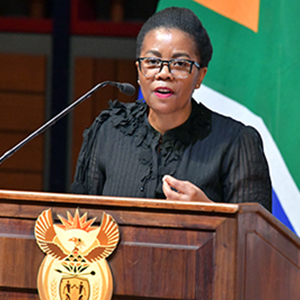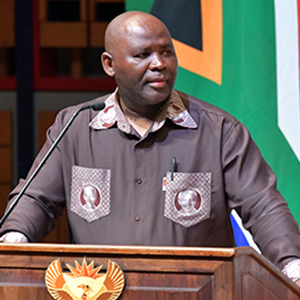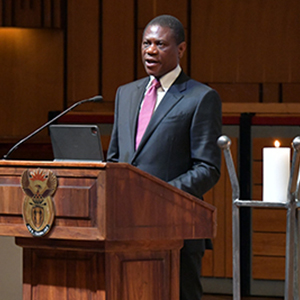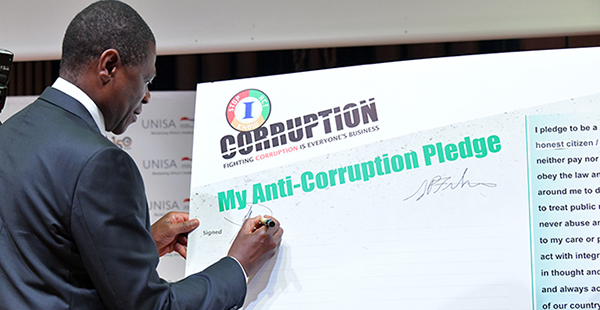News & Media
Corruption: a benefit to the minority against the majority
On 9 December, Unisa hosted the 2023 International Anti-Corruption Commemoration Summit in collaboration with the Public Service Commission (PSC) and the United Nations (UN) in South Africa, represented by the Office on Drugs and Crime and the UN Development Programme. The event was themed UNCAC at 20: Uniting the world against corruption.

Prof Puleng LenkaBula
International Anti-Corruption Day has been observed annually, on 9 December, since the passage of the United Nations Convention Against Corruption (UNCAC) on 31 October 2003 to raise public awareness for anti-corruption.
In attendance at the summit were members of the National Assembly, the National Anti-Corruption Advisory Council, a member of the House of Lords of the United Kingdom, and the Special Investigating Unit (SIU), among others. Throughout the programme, candles were lit in commemoration of whistleblowers who lost their lives as a result of reporting corruption.
Towards solution-driven leadership
In her opening address, Unisa Principal and Vice-Chancellor (VC), Prof Puleng LenkaBula, said that the world we live in is in turmoil. She said that public institutions such as universities, government and businesses are more than ever called upon to assume the mantle of vision and solution-driven leadership. She continued: "Whether it is the war in Gaza, the Democratic Republic of Congo, or Sudan, leadership, peace and ubuntu are required. Whether it is gender-based violence against women in leadership, or the decimation of the voices and opportunities of women and all people living with disabilities, empathy, leadership and social cohesion are required."
She continued: "Whether it is the acceleration of convergent technologies and discoveries in medical sciences, ethics and ubuntu are required, because human beings and machines and the environment co-exist in harmony, and without corruption the essence of life becomes even more meaningful."
The VC stated that for society, institutions and individuals, there is a need to delve deeper into understanding not only how corruption is established, but also how it comes about. She posed the question: "Who are the corrupters and the corrupted, and what are the mechanisms, laws and policies that can enable society to tackle corruption?"
In her conclusion, the VC said that a strong, capable and ethical state achieves anti-corruption with nobility, but one that is weak allows unscrupulous interests to intervene and mediate the allocation of resources in society. "Often," she added, "this leads to criminality, which weakens and leads to a delegitimisation of the state."
Rich in policy, but lacking in implementation

Prof Somadoda Fikeni
Prof Somadoda Fikeni, Chairperson of the PSC, stated that when everyone has left the venue and when years pass, no one will remember what was said or what was talked about, nor the venue, but they will remember what concrete steps were taken to combat corruption.
Fikeni stated that South Africa is rich in producing policies and frameworks, but tends to have a challenge on the implementation side. "It is for that reason," he continued, "that our focus, with the PSC’s partners, is on implementation."
"We recognise that the problem of corruption has become so pervasive that government, accountability institutions, civil society, academic institutions and the private sector, working alone, can no longer combat this scourge. We need a coordinated effort," said Fikeni.
Fikeni stated that apartheid was minority rule that took from the majority and gave to the minority, while corruption is also minority rule that takes from the majority and gives to the minority. He explained that it is for that reason that the same intensity witnessed in the fight against apartheid is needed in the fight against corruption, whether in the public or private sector, religious institutions, or non-governmental organisations.
In conclusion, Fikeni stated that the PSC, with its partners, has embarked on a number of concrete programmes to combat corruption, one of which was the development of the framework for professionalisation. "This," he said, "is because once you professionalise the public service and get the right people appointed because of their competence and not loyalty, you are one step closer towards improving the capacity of the state."
A persistent problem

Deputy President Paul Mashatile
In his keynote address, Deputy President of the Republic of South Africa, Paul Mashatile, stated that corruption is a persistent problem that inhibits development, fairness and equality in society.
Mashatile said that government is dedicated to eliminating corruption and dealing harshly with those who participate in it. Mashatile stated that as part of government’s commitment, the country signed the United Nations Convention Against Corruption on 9 December 2003 and ratified it on 22 November 2004. He explained that the ratification meant that the country, as a member state, is responsible for the obligations which include, among others, to promote and strengthen measures to prevent and combat corruption, and to promote, support and facilitate international cooperation and technical assistance in the prevention of and fight against corruption, including assets recovery.
Mashatile stated that the battle against corruption necessitates strategic collaborations across several sectors, which include government, labour civil society and academia.
In conclusion, Mashatile urged members of the public to report acts of corruption to authorities.

Deputy President Paul Mashatile signing the anti-corruption pledge
Decay of moral campus because of corruption
Lord Peter Hein, Member of the House of Lords of the United Kingdom, speaking on Lessons to be learnt to prevent future state capture, began by congratulating the South African government for banning Bane & Company, a global management consulting firm, from receiving the country’s contracts. He also asked governments from other countries to suspend the company "until," he continued, "it has answered to charges in the South African courts and repaid all fees earned from state-owned enterprises, estimated at R2 billion".
Hein stated that global banks admitted to opening their electronic banking channels to the Guptas and their associates. He said these banks profited from looted money, which could have been used for essential South African needs such as in hospitals, schools and job creation, among others.
He continued: "Corruption is like a cancer, infecting every part of the human body, which deters tourists and foreign investments, which is likely to turn the country into a failed state if it is not eradicated."
In his conclusion, Hein asked that the government implement Chief Justice Raymond Zondo’s recommendations from the Commission of Inquiry into State Capture. He continued: "Out of the ten recommendations that Zondo made, only four were implemented, and government should expedite the implementation of all recommendations in order to reclaim its reputable stature."
During the summit, various dignitaries from both the public and private sector signed an anti-corruption pledge to mark their commitment to upholding ethical standards and fighting against corruption in the various organisations they lead.
* By Godfrey Madibane, Acting Journalist, Department of Institutional Advancement
** Photography by Shooheima Champion, Multimedia Centre
Publish date: 2023/12/14

 Unisa co-hosts G20 community outreach in the Eastern Cape
Unisa co-hosts G20 community outreach in the Eastern Cape
 Unisans gain membership of prestigious science academies
Unisans gain membership of prestigious science academies
 Advocating for disability transformation through servant leadership
Advocating for disability transformation through servant leadership
 Unisa Press continues to illuminate the publishing space
Unisa Press continues to illuminate the publishing space